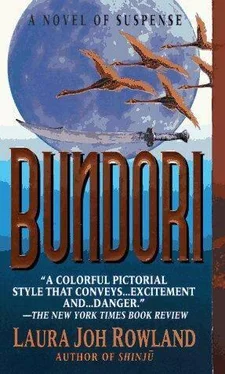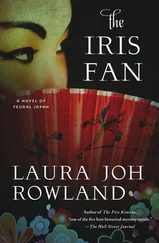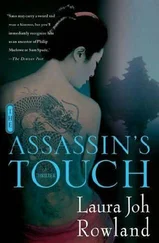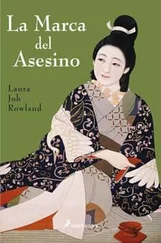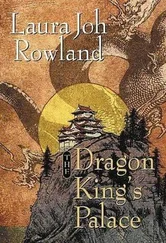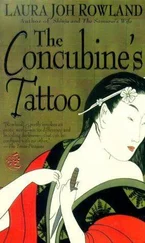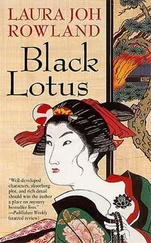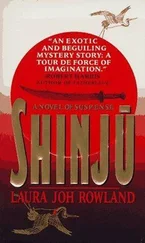“Silence!” Tokugawa Tsunayoshi clapped his hands.
The music ceased; conversation halted. The guests expectantly awaited their host’s words.
“As you know, this, ahh, banquet is being held in honor of Sōsakan Sano,” the shogun said, face flushed and speech slurred from the sake he’d consumed. “Tonight we officially celebrate two momentous events in the life of this most dedicated retainer, the first of which is, ahh, his capture of the Bundori Killer, who, I am glad to say, no longer terrorizes the city.”
Everyone turned to Sano. Hirata beamed in vicarious triumph. Noguchi smiled and bobbed his head. Magistrate Ueda merely nodded approval, but Sano saw genuine admiration in his eyes. The elders bowed gravely; the other guests applauded. Only Chamberlain Yanagisawa made no gesture of respect or congratulation. Yanagisawa, who Sano guessed-but couldn’t prove- was responsible for his beating. Yanagisawa, the “evil spirit” he might eventually have to destroy. Yanagisawa, powerless against him for only as long as he managed to retain the changeable Tokugawa Tsunayoshi’s favor. From his place at the shogun’s feet, he glared at Sano with undisguised hatred.
“ Sōsakan Sano’s deed required all the qualities most admirable in a samurai: courage, loyalty, intelligence, and, ahh, perseverance.” The shogun’s eyes twinkled. “Though I believe you had a little help from Chamberlain Yanagisawa?”
The shogun laughed heartily at his own quip. He’d received the news of Yanagisawa’s role in Chūgo’s capture with great amusement. He seemed unaware of the chamberlain’s attempts to obstruct the investigation; Sano, prohibited from speaking ill of a superior, hadn’t told him. The guests, except for the chamberlain, laughed too. Yanagisawa’s gaze shot pure venom at Sano. With a fingertip, he touched the scars on his lip and eyelid.
“Now,” continued Tsunayoshi, “I shall perform a song I have composed, describing the trial of Chūgo Gichin.
“ It was during the time of the cherry blossoms
That evil was vanquished -”
The manner of Chūgo’s demise had so tickled the shogun’s fancy that he’d completely forgotten the doubts Chamberlain Yanagisawa had instilled in him and welcomed Sano back into his favor. He’d even come to the Court of Justice to watch Chūgo’s trial. Now, as the shogun chanted his song, Sano relived the unforgettable experience.
Three days after the capture, Sano had appeared before Magistrate Ueda to present the evidence against the accused. While the shogun smiled delightedly and a curious crowd gathered outside the hall’s barred windows, Sano described how he’d identified Chūgo as a suspect, then tricked him into revealing himself as the killer.
“A later search of Chūgo’s house revealed a list of the names and whereabouts of Araki and Endō clan members,” Sano continued. “I also found the mate to the death’s-head sword given me by the witness whose confidential statement you just heard. And I found deeds to three houses-one in Nihonbashi, the others near Yoshiwara and Zōjō Temple -all under different aliases. Chūgo’s financial records prove that he bought them with money borrowed from Matsui Minoru. When I searched the houses, I found boards, spikes, face paint, incense, and traces of blood.”
Magistrate Ueda, dignified in his black garments, sat upon the dais, flanked by secretaries who recorded the proceedings. “The case seems sufficient,” he said. To the courtroom attendants: “Bring in Chūgo Gichin.”
Sano heard Chūgo coming before the guard captain reached the hall. From the mob outside came angry calls for the Bundori Killer’s blood, and above the commotion rose Chūgo’s wild rantings. The guard captain had gone completely mad during his stay in Edo Jail.
The main door flew open, and the attendants dragged in the cursing, thrashing defendant. The shogun, his retinue, and the rest of the audience gasped and murmured. Sano stared, amazed at the change in Chūgo.
Stripped of swords, armor, and Tokugawa crests, Chūgo wore a torn, filthy cotton kimono. His wrists were tied behind his back and iron shackles hobbled his legs. His eyes rolled; his teeth were bared in a fierce grimace.
“May demons destroy all you who would stop me from honoring my ancestor as a samurai should!” he shouted, trying to throw off his escorts.
The attendants dumped him on a mat on the shirasu -the “white sand of truth” that covered the floor before the magistrate’s dais. Not until they’d administered several hard kicks did he kneel and cease cursing, and even then, an angry, animal growl rumbled in his throat. Though Sano couldn’t forget Chūgo’s terrible crimes, he could pity the once proud warrior.
“Chūgo Gichin, you are charged with the murders of four men: Kaibara Tōju, hatamoto to His Excellency; the rōnin Tōzawa Jigori; the priest Endō Azumanaru; and an eta ,” Magistrate Ueda said. “You are also accused of ordering two attacks on Sōsakan Sano: one by a mercenary swordsman in Nihonbashi; the other at Edo Castle. What have you to say in your own defense?”
“They were not murders,” Chūgo snapped. “They were acts of war. Of vengeance. The Endō and the Araki killed my lord Oda Nobunaga, and for that they deserved death by my hand!”
Obviously unable to distinguish his victims from the long-dead traitors or himself from General Fujiwara, he flung a wild glance at Sano. “I had to act before Kaibara, the last member of the Araki clan, died. Then I decided to kill every last Endō. That cursed sōsakan tried to stop me, so I hired an assassin to kill him. And if someone else hadn’t already had him beaten, I would have!”
Magistrate Ueda frowned. “Then you deny the last charge, but not the others?”
“Deny what I’ve done?” Chūgo’s laugh resembled a dog’s howl. “Why? I want the world to know that General Fujiwara is at last avenging his lord’s murder!”
Exclamations swept the audience. Sano, though shocked by the extent of Chūgo’s delusion, was relieved that his confession would shorten his path to justice.
“Silence.” Magistrate Ueda’s raised hand quieted the room. “Then, Chūgo, you do not repent of the crimes to which you have confessed?”
“Repent? Pah! A samurai doesn’t apologize for doing his rightful duty by his master.”
There was a fresh outcry from the audience, which Magistrate Ueda also silenced. “Then I am sorry to say that I must deny you the privilege of committing seppuku to which your rank entitles you. Instead you will be beheaded at the public execution ground immediately, and your remains displayed as a warning to would-be criminals.”
Sano closed his eyes as the guards dragged Chūgo from the hall. The awful spectacle of disgrace poisoned his satisfaction at seeing his investigation successfully concluded, a killer brought to justice. Through his horror, he heard the shogun’s high, excited voice:
“Ahh. A marvelous show. Well done, sōsakan !”
Now that same voice recalled Sano to the present. “Yes, this is an accomplishment that must be entered into the nation’s official history.” Tokugawa Tsunayoshi’s face brightened with inspiration. “Since you are a historian, you yourself shall have the privilege of chronicling your, ahh, miraculous deeds for the castle archives.”
Heads nodded; murmurs of approval came from the guests.
“This is a great honor, and I thank you, Your Excellency.” Sano tried to infuse his voice with enthusiasm. Here at last was the fulfillment of his promise to his father. Sano took pride in his deed; his samurai spirit basked in the shogun’s praise. But Sano still felt as though his heart had been torn from his chest, leaving behind a vast, aching emptiness that grew larger and hurt more with each passing day.
Читать дальше
